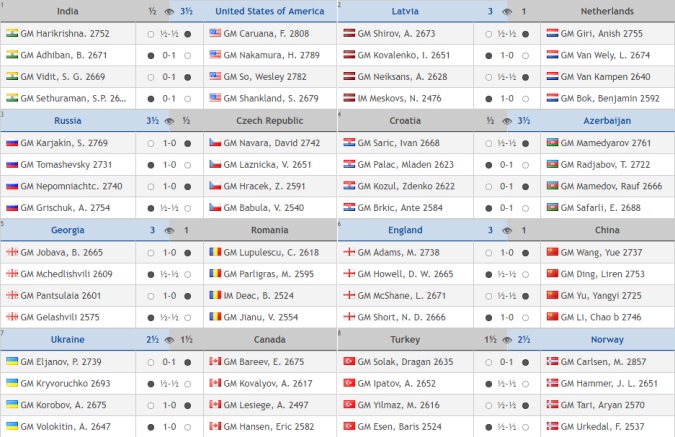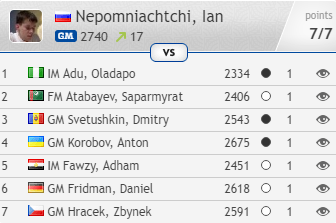Baku 2016, 7: It’s a USA-Russia showdown
The USA overwhelmed India 3.5:0.5 on Friday to set up the most anticipated match of the 2016 Baku Olympiad – a potential gold medal decider between the USA and Russia. Russia are currently a point back with five more teams, including England, who scored a stunning 3:1 victory over defending champions China. Remarkably the same USA-Russia match will be played in the women’s section, where Azerbaijan, the Netherlands and China are also in the five-team group that leads with four rounds to go.
For a video summary of the whole day’s action check out the IM Nikolas Lubbe’s recap:
USA end India’s perfect run
The battle to get into medal contention at the Baku Olympiad is fierce, and in Round 7 of the Open Section the top 13 matches all produced a winner (Belarus 2:2 Germany was the first draw). The action we’re going to focus on was on the top eight tables:

There’s nowhere else to start but with the USA flexing its considerable muscles to finally stop the Indian juggernaut. It was always going to be tough for India, since it’s not just that the USA have three top 10 players on their team, but those players are all performing above their rating!

Let the battle commence! | photo: Fiona Steil-Antoni
In Round 8 they showcased their particular talents. Fabiano Caruana was fearless as he took on Harikrishna in the sharpest possible game, sacrificing a piece for activity against the white king. It may objectively not have been enough, but when the Indian star did the seemingly logical thing – exchanging queens – it played into Caruana’s hands, with Harikrishna forced to head for a draw before he got into trouble.
On boards 2 and 3 the American team was unstoppable. Hikaru Nakamura seemed to have seen everything in a complex tactical sequence involving multiple pinned pieces. When the dust settled he had an easy win over Adhiban. Wesley So, meanwhile, pulled off his usual trick of converting a slight edge into a win with flawless technique. Vidit never stood a chance.
Luckily for Sethuraman that meant his adventures against Sam Shankland were irrelevant to the match outcome – though it didn’t seem that way at the time. From the moment the US player allowed his opponent to get rooks on the second rank it looks as though White was busted, with the evaluation climbing as high (or low, if you prefer) as -13.04. So what went wrong? Well, in fairness to Sethuraman, the killer blows were anything but trivial – especially to find in time trouble in such a crucial match. Black needed to calculate, or believe on intuition alone, that he could sacrifice both minor pieces starting with 33…Nxe3!!

Sam Shankland uses up one of his lives | photo: Maria Emelianova, Baku Chess Olympiad

Replay the game and try out the moves in our broadcast system
Instead after 34.Be7? 34.Rd7! Rab2? all White’s edge had gone. In a few more moves the white king had escaped the trap, the white pieces were suddenly targeting the black king and, crucially, White was simply two pawns up. Sethuraman put up defiant resistance, but had to concede defeat on move 75.
That win saw the US team leapfrog India into the sole lead with 6 wins and 1 draw, meaning those who wanted to remain in the chasing pack needed to win. Russia did that in style, with Sergey Karjakin dispelling any team nerves when he cut through Czech no. 1 David Navara’s defences in just 24 moves (four of which weren’t strictly necessary!). Evgeny Tomshevsky rehabilitated himself after the Ukrainian debacle with a convincing win over Laznicka, while Nepomniachtchi did his thing – manoeuvred around in a roughly equal position until his opponent crumbled towards the time control. That’s 7 out of 7 for Nepomniachtchi now in Baku – for once someone actually completed “a Caruana”! (yes, the opposition hasn’t quite been of Sinquefield Cup level - but maybe he isn’t finished yet…).


49-year-old Evgeny Bareev, 51-year-old Nigel Short and 64-year-old Eugenio Torre all won on a great day for the veterans in Baku | photo: David Llada, Baku Chess Olympiad
Ukraine bounced back after their loss to the USA, but it wasn’t exactly convincing. Pavel Eljanov sacrificed a piece for no less than four pawns, one of them on the seventh rank, but that wasn’t enough to stop the wily Evgeny Bareev winning the endgame. Although Bareev now plays for Canada, he may have thought of that as some kind of “revenge” for the Russian team’s earlier loss to Ukraine.
source:https://chess24.com/en/read/news/baku-2016-7-it-s-a-usa-russia-showdown

























